|
|
|
Sort Order |
|
|
|
Items / Page
|
|
|
|
|
|
|
| Srl | Item |
| 1 |
ID:
140918
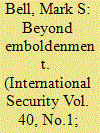

|
|
|
|
|
| Summary/Abstract |
What happens to the foreign policies of states when they acquire nuclear weapons? Despite its importance, this question has not been answered satisfactorily. Nuclear weapons can facilitate six conceptually distinct foreign policy behaviors: aggression, expansion, independence, bolstering, steadfastness, and compromise. This typology of foreign policy behaviors enables scholars to move beyond simple claims of “nuclear emboldenment,” and allows for more nuanced examination of the ways in which nuclear weapons affect the foreign policies of current and future nuclear states. The typology also sheds light on Great Britain's response to nuclear acquisition. Britain used nuclear weapons to engage in greater levels of steadfastness in responding to challenges, bolstering junior allies, and demonstrating independence from the United States, but it did not engage in greater levels of aggression, expansion, or compromise. The typology and the British case demonstrate the value of distinguishing among different effects of nuclear weapons acquisition, have implications for scholars' and policymakers' understanding of the role of nuclear weapons in international politics, and suggest avenues for future research.
|
|
|
|
|
|
|
|
|
|
|
|
|
|
|
|
| 2 |
ID:
189015
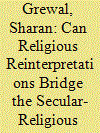

|
|
|
|
|
| Summary/Abstract |
Domestic politics around the globe have become increasingly polarized along secular-religious lines. Recent literature suggests that one way to ease secular-religious tension and gridlock is for religious leaders to offer progressive reinterpretations of religious texts, that might convince religious conservatives to compromise from their seemingly-fixed policy positions. But can everyday citizens deploy religious reinterpretations themselves? We examine this question through a series of citizen debates in Tunisia, in which 602 participants attempted to reach a compromise over two ‘culture wars’ issues. Across both experiments, we find that having secular liberals engage religious conservatives with religious reinterpretations backfired, nearly halving the rate of compromise. Religious reinterpretations produced both defensive conservatives and emboldened liberals, obstructing compromise between them. While scholarship suggests that religious leaders may be able to deploy reinterpretations effectively, our results caution that everyday citizens may not.
|
|
|
|
|
|
|
|
|
|
|
|
|
|
|
|
| 3 |
ID:
123220


|
|
|
|
|
| Publication |
2013.
|
| Summary/Abstract |
Although China has consistently rejected any binding emissions cut commitments in international climate change negotiations, it has made some compromises so as to maintain unity with the Group of 77 and to extract concessions and benefits from developed countries in general, and the U.S. in particular.
|
|
|
|
|
|
|
|
|
|
|
|
|
|
|
|
| 4 |
ID:
114812
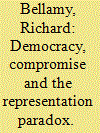

|
|
|
|
|
| Publication |
2012.
|
| Summary/Abstract |
Coalitions are often condemned as undemocratic and unprincipled because of the compromises they involve. Politicians are accused of betraying the commitments they made during the election. Paradoxically, proponents of this view suggest that if compromises are to be made they should be pragmatic and based on policy rather than principle. This article disputes this thesis and defends compromise as both principled and democratic. The first section distinguishes a shallow compromise based on the maximal satisfaction of exogenously defined preferences from a deep compromise resulting from reasoning on principle, and argues it proves impossible to avoid the latter. The second section suggests that the obligation to compromise forms part of the ethos of democracy, whereby citizens must agree despite their disagreements. The third section concludes by showing that while representatives will almost certainly betray their electoral mandate if obliged to make only shallow compromises, they can legitimately engage in deep compromises for their voters when they reason as they do.
|
|
|
|
|
|
|
|
|
|
|
|
|
|
|
|
| 5 |
ID:
128818
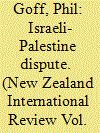

|
|
|
| 6 |
ID:
179162
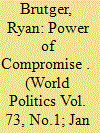

|
|
|
|
|
| Summary/Abstract |
In an era of increasingly public diplomacy, conventional wisdom assumes that leaders who compromise damage their reputations and lose the respect of their constituents, which undermines the prospects for international peace and cooperation. This article challenges this assumption and tests how leaders can negotiate compromises and avoid paying domestic approval and reputation costs. Drawing on theories of individuals’ core values, psychological processes, and partisanship, the author argues that leaders reduce or eliminate domestic public constraints by exercising proposal power and initiating compromises. Employing survey experiments to test how public approval and perceptions of reputation respond to leaders’ strategies across security and economic issues, the author finds attitudes toward compromise are conditioned by the ideology of the audience and leader, with audiences of liberals being more supportive of compromise. In the US case, this results in Republican presidents having greater leeway to negotiate compromises. The article’s contributions suggest that leaders who exercise proposal power have significant flexibility to negotiate compromise settlements in international bargaining.
|
|
|
|
|
|
|
|
|
|
|
|
|
|
|
|
| 7 |
ID:
186388
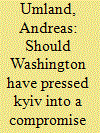

|
|
|
|
|
| Summary/Abstract |
This article was submitted in late 2021, and became dated after Russia's demonstrative preparation as well as start of an open, large-scale invasion of Ukraine early 2022. We nevertheless publish this commentary here in order to document the debate about the events leading to the escalation. No adaptations to the original 2021 article were made after the outbreak of high-intensity war on 24 February 2022. Avoiding a larger military escalation in the Russian–Ukrainian conflict is an important aim. Yet, historical experience suggests that concessions by Ukraine or its Western partners toward Russian revanchist aspirations in the Donbas may not help achieve it. On the contrary, Western softness, and Ukrainian weakness vis-à-vis the Kremlin will lead to further confrontation.
|
|
|
|
|
|
|
|
|
|
|
|
|
|
|
|
| 8 |
ID:
157086
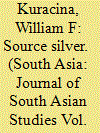

|
|
|
|
|
| Summary/Abstract |
This paper examines Indian socialist ideals that transcended India's Independence in 1947. It introduces a Delhi Police Special Branch confidential informant, ‘Source Silver’, who monitored socialist activities in 1946 and 1947—a peculiar situation in which the conduct of socialist Congressmen was scrutinised by Congressmen in office. The essay also highlights the precise continuity of socialist ideals which originated within the first few years of the Congress Socialist Party's founding and continued after Independence. Likewise, it suggests that these ideals proved ill-suited to the Interim Government period from September 1946 up to the eventual transfer of power in August 1947, a misalignment which prompted Congress socialists to separate from, or have their separation engineered by, the Indian National Congress in early 1948.
|
|
|
|
|
|
|
|
|
|
|
|
|
|
|
|
|
|
|
|
|